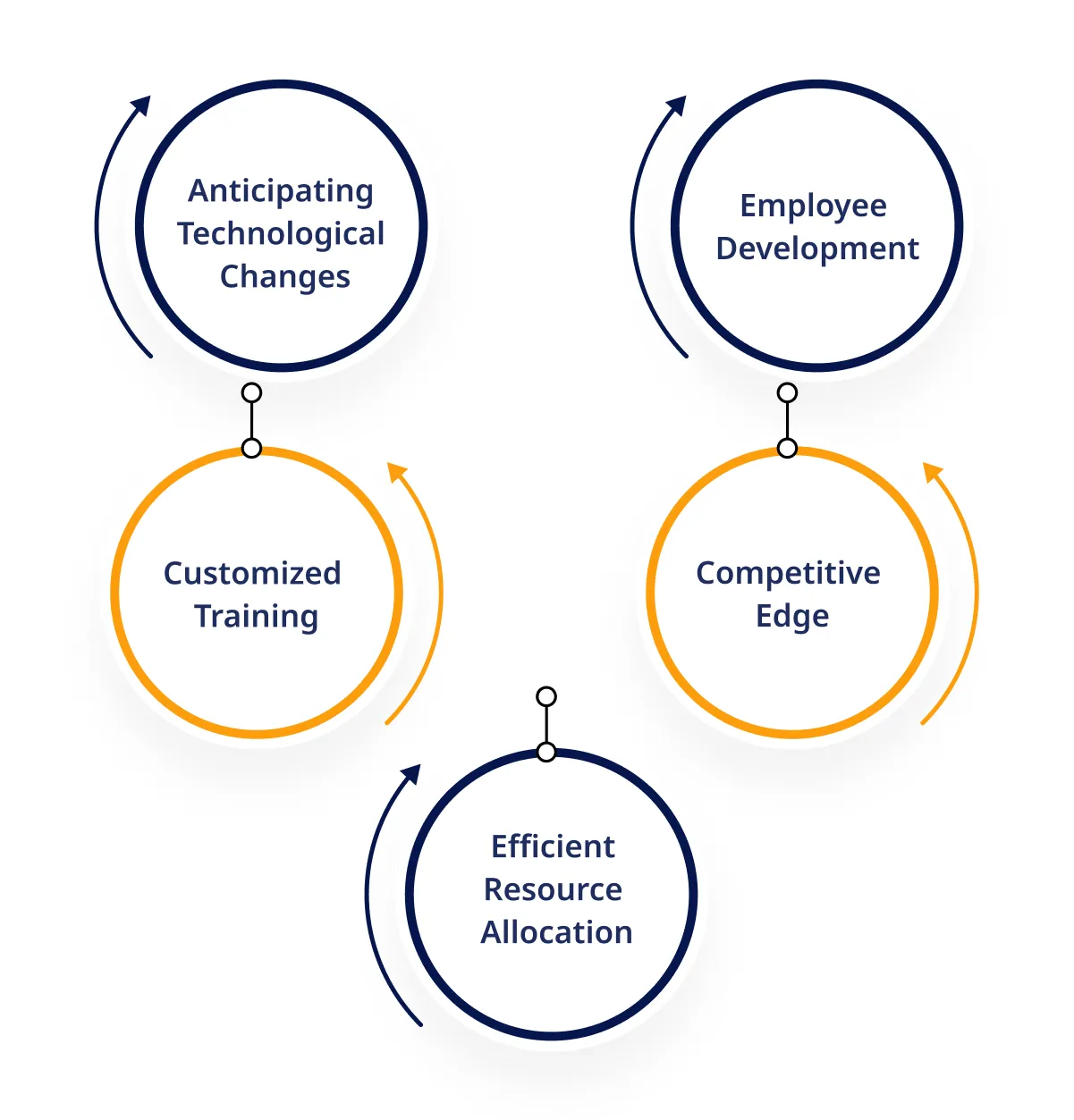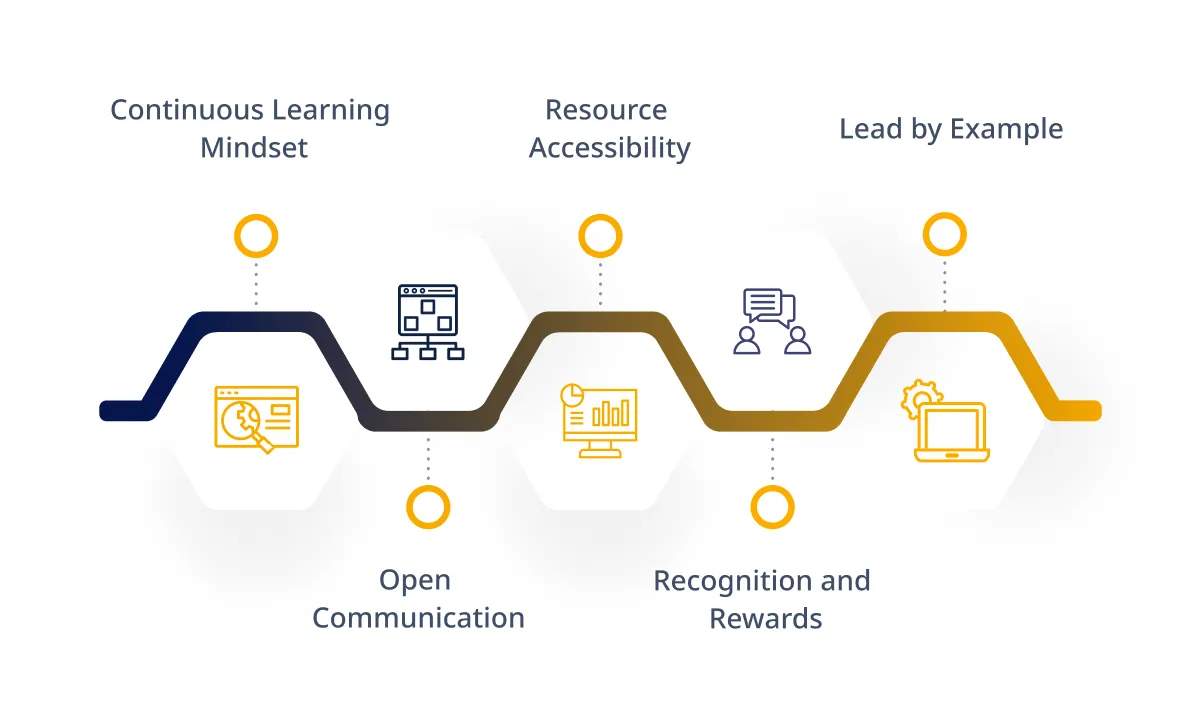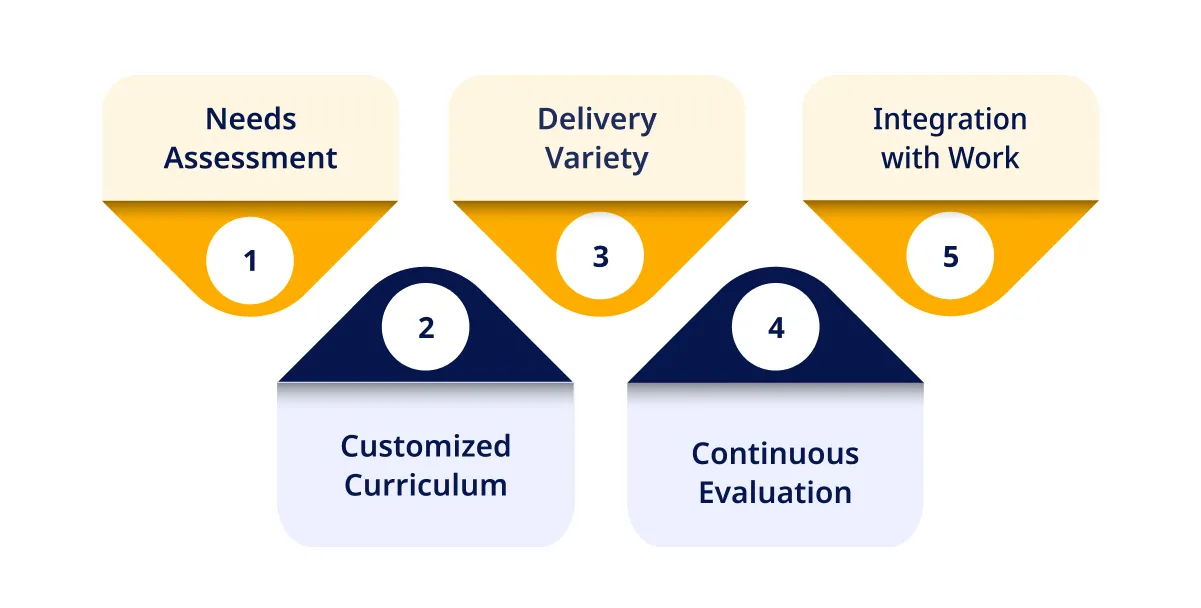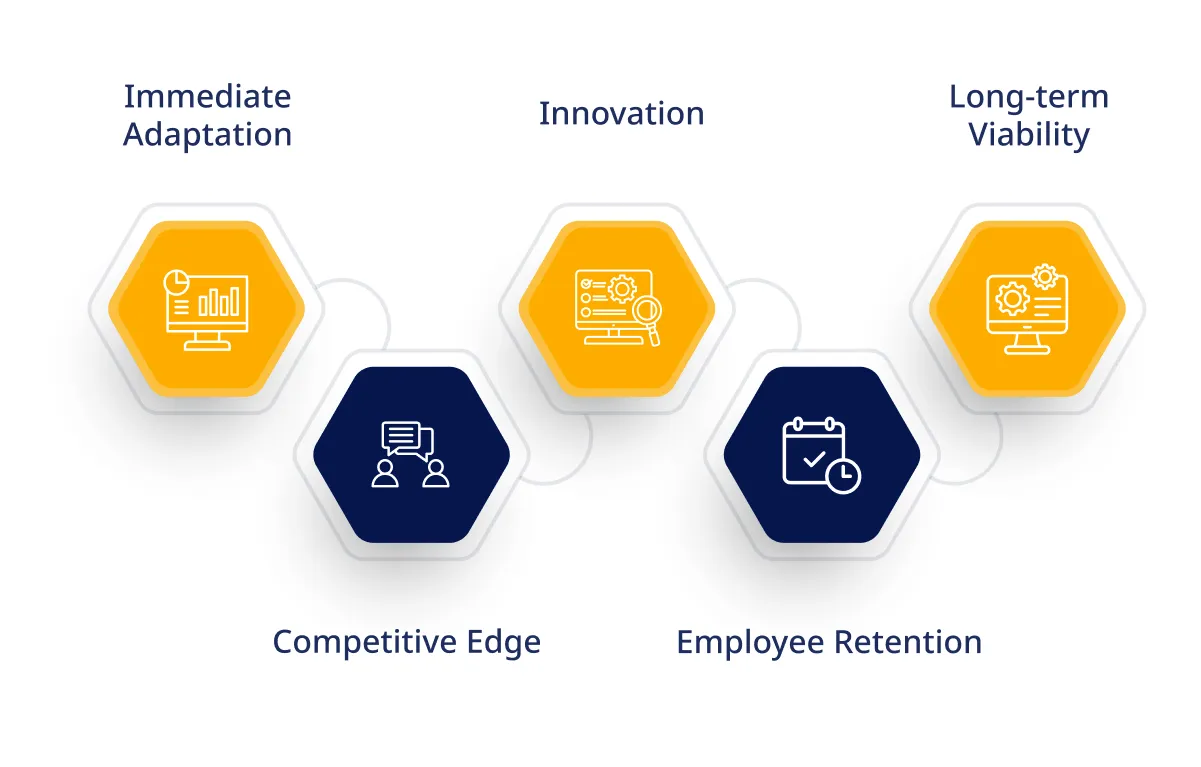Do your tech workers possess the skills needed for tomorrow’s challenges?
With technology evolving rapidly, the answer to this question can determine the success or stagnation of your business.
According to recent surveys, a staggering 40% of tech professionals worry that their skills might soon become outdated.
But here’s the good news: By future-proofing your tech workers and empowering workforces, you can not only bridge this skills gap and drive innovation and growth.
This blog will unveil actionable tips and strategies to ensure your tech workforce remains at the forefront of the digital revolution.
Let’s embark on a journey to secure your company’s future with a tech-savvy team.
Why Upskilling and Reskilling are important?
Upskilling and reskilling are crucial steps to future-proof tech workers and empowering workforces.
Technology is evolving so fast that what was cutting-edge yesterday might be outdated tomorrow.
This changing pattern has made reskilling for future tech a vital part. Let’s look at more reasons to upskill and reskill:
1. Adaptability
The tech industry is dynamic and constantly developing. New programming languages, frameworks, and tools emerge frequently.
Upskilling technology workers involves providing your tech workers with the training and knowledge needed to stay relevant in this ever-changing landscape.
When your employees possess the latest skills, they can quickly adapt to new technologies and challenges, ensuring that your organization remains competitive and efficient.
2. Competitive Edge
Competition to hire top remote developers or professionals is fierce in the tech job market. Tech workers who continually update their skills become more desirable to potential employers.
As an organization, investing in workforce management solutions to upskill your employees can help attract top talent and retain your valuable workforce. A tech-savvy team is a significant asset in the competitive world of technology.
Unlock success in cutting-edge skills and continuous learning initiatives.
3. Innovation
Innovation is the driving force behind the tech industry’s growth and success. Tech workers who are well-versed in the latest developments can contribute fresh ideas and solutions to the organization.
They can identify new opportunities and implement creative solutions, ultimately boosting your company’s competitiveness and market presence.
4. Productivity
Upskilling technology workers improve productivity. When employees have the required skills and knowledge to complete their tasks effectively, they can work more efficiently.
This increased efficiency not only benefits individual employees but also has a positive impact on the overall productivity and performance of your organization. Reduced errors and faster project completion are among the potential benefits.
5. Employee Satisfaction
Empowering workforces through upskilling and reskilling initiatives demonstrates your commitment to their professional growth and development. This can boost employee satisfaction, morale, and loyalty.
Employees who feel valued and supported in their career development are more likely to stay with your organization, reducing turnover and associated hiring costs.
Upskilling and reskilling are vital strategies for ensuring your tech workers remain adaptable, competitive, and innovative.
These initiatives benefit your employees, while directly & positively impacting your organization’s productivity, competitiveness, and employee satisfaction.
By investing in continuous growth and tech workforce development, you are securing the future of your business in an ever-evolving tech landscape.
Invest in tech workforce for a competitive and innovative future.
Set Company Goals
Setting clear company goals is essential to future-proof tech workers and tech workforce empowerment. But how do these goals make a difference?
1. Alignment
When your company’s objectives are closely aligned with the development of your tech workforce, it ensures that the skills your employees acquire are directly beneficial to the organization.
This alignment creates a win-win situation where both the company and the employees benefit.
2. Focus
Clearly defined goals help in focusing your resources and efforts. It makes identifying the most crucial skills for your workforce management web application development easier.
This targeted approach ensures that your tech workers gain the most relevant skills to your business.
3. Measurable Success
Setting company goals allows you to measure your progress. You can track how well your tech workers acquire the necessary skills and how these skills contribute to the company’s success.
This data-driven approach assists you in making informed decisions.
4. Motivation
Clear company goals can be motivating for your tech workers. When they see that their skill development is directly tied to the organization’s success, they are more likely to be engaged and committed.
This motivation can lead to higher productivity and job satisfaction.
5. Competitive Advantage
In the tech industry, having a workforce aligned with your company’s objectives and equipped with the right skills gives you a competitive advantage.
- It enables your organization to adapt swiftly to changing market conditions and technological advancements.
- It empowers your workforce and ensures their acquired skills directly benefit your organization.
- It provides focus, measurement, motivation, and a competitive edge in the ever-evolving tech landscape.
Setting company goals with digital transformation consulting services that align with future-proofing your tech workers is a strategic move.
Also read: Digital Transformation: Top Strategies For Modernizing Your Business
Identify Future Needs and Skill Gaps
Identifying future needs and skill gaps is critical to future-proofing tech workers and empowering workforces. But how does this process work, and why is it essential?
1. Anticipating Technological Changes
To future-proof tech workers, you must predict the skills that will be in demand in the future.
This involves staying updated on industry trends and technological advancements. By doing so, you can proactively address skill gaps.
2. Customized Training
Recognizing skill gaps enables you to tailor training programs to the specific requisites of your workforce preparedness.
Rather than offering generic training, you can provide targeted education that equips your employees with the precise skills required for your industry.
3. Efficient Resource Allocation
Identifying skill gaps helps you allocate resources more efficiently. Instead of investing in broad training that may not address your employees’ needs, you can direct your efforts and budgets toward the most critical areas.
Also read: Overcoming Challenges In Custom Software Development: Effective Strategies And Best Practices
4. Competitive Edge
Knowing the future needs of the tech industry allows you to get ahead of the competition.
By developing the operational management skills required before others do, you can position your organization as a leader in your field.
5. Employee Development
Identifying and addressing skill gaps demonstrates your commitment to your employees’ professional growth. This can boost morale, job satisfaction, and employee retention.
Identifying future needs and skill gaps is essential for future-proofing tech workers and empowering workforces.
It allows you to anticipate changes, provide customized training, allocate resources efficiently, gain a competitive edge, and enhance employee development.
This proactive approach ensures that your tech workers are well-prepared for the challenges and opportunities of the tech industry.
Empower your workforce with targeted skill development and future readiness.
Create an Upskilling / Reskilling Culture
Creating an upskilling and reskilling culture is vital in future-proofing tech workers and empowering workforce. But how can you build this culture effectively?
1. Continuous Learning Mindset
Encourage a culture where learning is a constant process.
Make it clear that acquiring new skills is not a one-time event but an ongoing process. Employees should feel they have the support to learn and grow throughout their careers.
2. Open Communication
Foster an environment where employees can openly discuss their technology skill enhancement needs and career aspirations.
This allows you to tailor upskilling and reskilling efforts to individual goals and organizational requirements.
3. Resource Accessibility
Ensure that the necessary resources, such as training materials and courses, are readily available.
Make it accessible for employees to access these resources, whether it’s through a learning management system or physical materials.
4. Recognition and Rewards
Recognize and reward employees who actively engage in upskilling and reskilling.
This can be through promotions, bonuses, or public recognition, motivating others to follow suit.
5. Lead by Example
Leadership should set an example by participating in upskilling and reskilling programs.
When employees see their leaders investing in their development, they are more likely to embrace the culture of continuous learning.
Providing a flexible, rewarding, and positive culture ensures your tech workers are empowered to adapt and grow, making your organization future-proof in the dynamic tech industry.
Also read: Popular E-Learning App Development Trends Impacting Educational Sector
Create Training Programs
Effective training programs are key in future-proofing tech workers and empowering workforces.
But what does it take to design programs that truly make a difference?
1. Needs Assessment
Start by assessing the specific skill needs of your tech workforce. Understand what skills are required to achieve organizational goals and address skill gaps.
This data-driven approach ensures your training aligns with your objectives.
2. Customized Curriculum
Develop training programs tailored to your employees’ needs.
This ensures that the skills taught directly relate to their roles, increasing engagement and effectiveness.
3. Delivery Variety
Consider various training delivery methods, such as in-person workshops, online courses, or mentorship programs.
Different employees may have different learning preferences, so offering diverse options increases accessibility.
4. Continuous Evaluation
Regularly evaluate the effectiveness of your training programs.
Collect participant feedback to identify improvement areas and adapt your training strategies accordingly.
5. Integration with Work
Align training with day-to-day work. When employees can apply what they learn directly to their tasks, it enhances skill retention and practicality.
Creating training programs that future-proof tech workers and empower your workforce involves:
- Conducting needs assessments
- Designing customized curricula
- Offering diverse delivery methods
- Continuously evaluating effectiveness, and
- Integrating training with daily work
These programs ensure your tech workers acquire the skills to thrive in the ever-evolving tech industry.
Future-proof your workforce with custom skill programs.
Fill Jobs within the Company
Filling jobs from within your organization is a critical strategy in future-proofing tech workers and empowering workforces. But why is this approach so valuable?
1. Recognition and Motivation
Recognizing the efforts and skills of your employees motivates them to continue developing their skills and contributing to the organization’s success.
2. Knowledge of Company Culture
Internal hires already know your company’s culture, values, and practices. They can go through a simple onboarding process, saving time and resources.
3. Skill Retention
Your employees have accumulated valuable knowledge about your organization, its processes, and industry-specific insights. This knowledge is retained and leveraged when you promote it from within.
4. Enhanced Loyalty
Promoting from within fosters a sense of loyalty among your workforce. Employees see opportunities for growth and career advancement within the company, making them more likely to stay long-term.
5. Cost Savings
Hiring externally often involves higher recruitment costs, such as advertising, interview expenses, and relocation packages. Filling jobs from within typically results in cost savings.
Filling jobs within your organization is a powerful strategy for future-proofing tech workers and empowering workforces.
It recognizes and motivates employees, leverages their knowledge of company culture, retains valuable skills, enhances loyalty, and often leads to cost savings. This approach benefits your employees and your organization’s long-term success in the dynamic tech industry.
Also read: How To Hire Software Developers: An In-Depth Guide
The Future Is Now
The future is here, and it’s a call to action for future-proofing tech workers and empowering workforces. So, what does this mean for your organization?
1. Immediate Adaptation
The tech industry evolves rapidly, and staying ahead requires immediate adaptation.
Delaying upskilling or reskilling efforts can leave your tech workers unprepared for the challenges of tomorrow.
2. Competitive Edge
Embracing the future now gives you a competitive edge. Organizations that equip their workforce with updated skills and knowledge are better positioned to outperform competitors.
3. Innovation
The future is filled with innovation, and tech workers at the forefront of new developments are the ones who will drive these innovations.
Your organization can be a leader in technological advancements.
4. Employee Retention
Empowering workforces for the future can enhance employee retention.
When employees see that their skills are continuously updated and aligned with organizational goals, they are likelier to stay with your company.
5. Long-term Viability
Ensuring your tech workers are prepared for the future enhances the long-term viability of your organization.
It means adaptability, innovation, and competitiveness in an ever-changing tech landscape.
Future now is crucial for future-proofing tech workers and empowering workforces.
- Immediate adaptation
- Gaining a competitive edge
- Driving innovation
- Enhancing employee retention
- Ensuring long-term viability
These are the few benefits of embracing the future today. This proactive approach secures the success of your organization in the dynamic tech industry.
Empower your team for long-term success.
Conclusion
In the ever-changing tech realm, the time to future-proof tech workers and empower workforces is now.
The road to success begins with aligning company goals, identifying skill gaps, fostering a culture of upskilling, creating effective training programs, promoting from within, and understanding that the future is already upon us.
Don’t wait!
Seize this opportunity to stay competitive, innovate, and retain top talent. Your journey toward a tech-savvy, future-ready team starts today.
Contact us to explore more valuable insights, and let’s embark on this exciting transformation together.
The future belongs to those who are prepared. Embrace it now!












